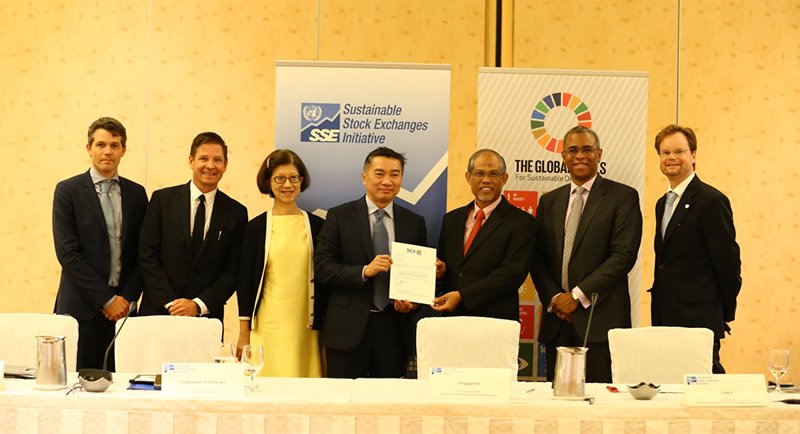Nearly 60 stock exchanges, representing more than 70% of listed equity markets, and some 30,000 companies with a market capitalization of over $55 trillion, have now made a commitment to "advancing sustainability in their markets" by joining the SSE Initiative, the initiative's 2016 progress report said.
This includes the Singapore Exchange (SGX) which joined during the 2016 SSE Global Dialogue held in Singapore on 6 September.
"As a market operator and regulator, SGX is committed to leading the sustainability advancement in Singapore's capital market," SGX chief operating officer Loh Boon Chye said. "We look forward to both contributing and learning from the other partners of this exciting initiative."
Stock exchanges are uniquely positioned to influence their market in a way few other players can. In addition to their ability to influence investor and company behaviour, exchanges often support regulators in promoting the adoption of market standards.
The transition to a sustainable financial system means that "market incentives must be aligned with long-term values and environmental, social, and governance considerations need to be integrated into standard practice," the report says.

Twelve SSE partners now incorporate reporting on environmental, social, and governance information into their listing rules and 15 provide formal guidance to issuers, the report said.
"The Sustainable Development Goals outline many of these environmental, social, and governance factors and provide a framework to address them," the report says.
Stock exchanges can take concrete steps on five of the 17 SDGs, adopted by UN member States in September 2015, the report says.
These Goals include 5, 8, 12, 13, and 17 on gender, decent work and economic growth, responsible production and consumption, climate change, and global partnerships.
Achieving the Goals will require a large injection of finance, at least some of which will have to come from the private sector.
"Achieving the SDGs requires significant financing, estimated at $5-7 trillion per year," the report says, citing UNCTAD's 2014 World Investment Report.
"While public funding and development assistance remains important, the scale of the investment challenge requires new flows of private capital," it says.
Describing how stock exchanges represent the intersection between companies and investors, the report notes a growing body of evidence that shows the positive correlation between ESG (environment, society, and governance) performance and strong financial performance too.
However, it notes that financial markets could do more to support achievement of the SDGs.
The SSE Initiative was launched by UN Secretary-General Ban Ki-moon in 2009. It is organized by UNCTAD, the United Nations Global Compact, the United Nations Environment Programme Finance Initiative (UNEP-FI) and the Principles for Responsible Investment (PRI).


